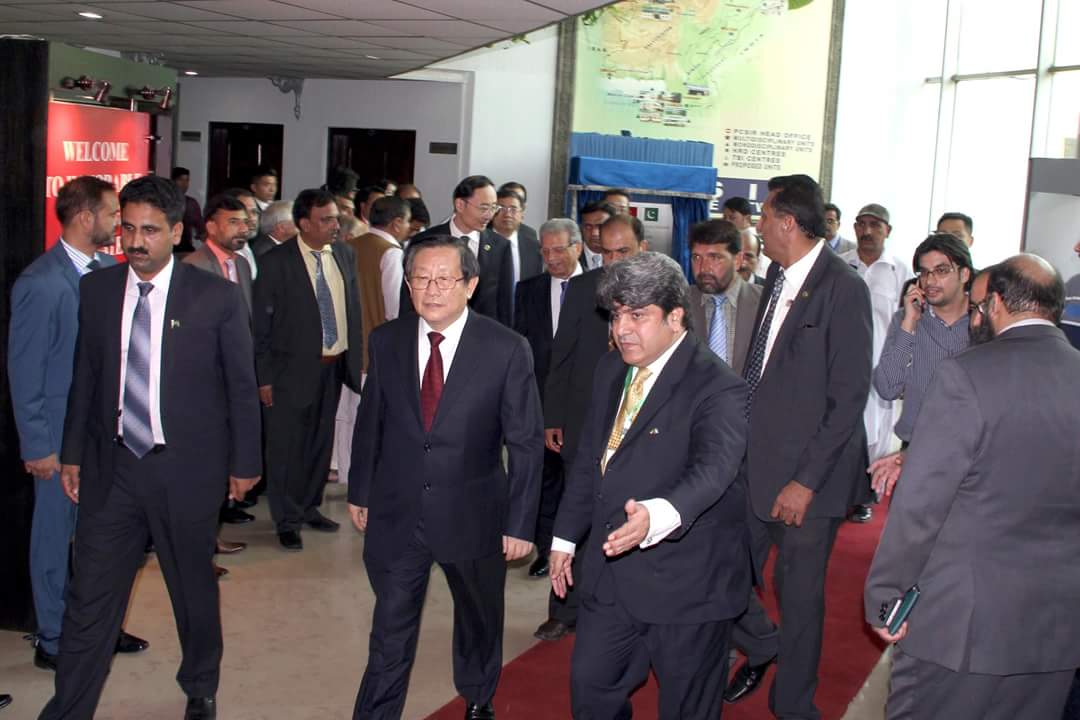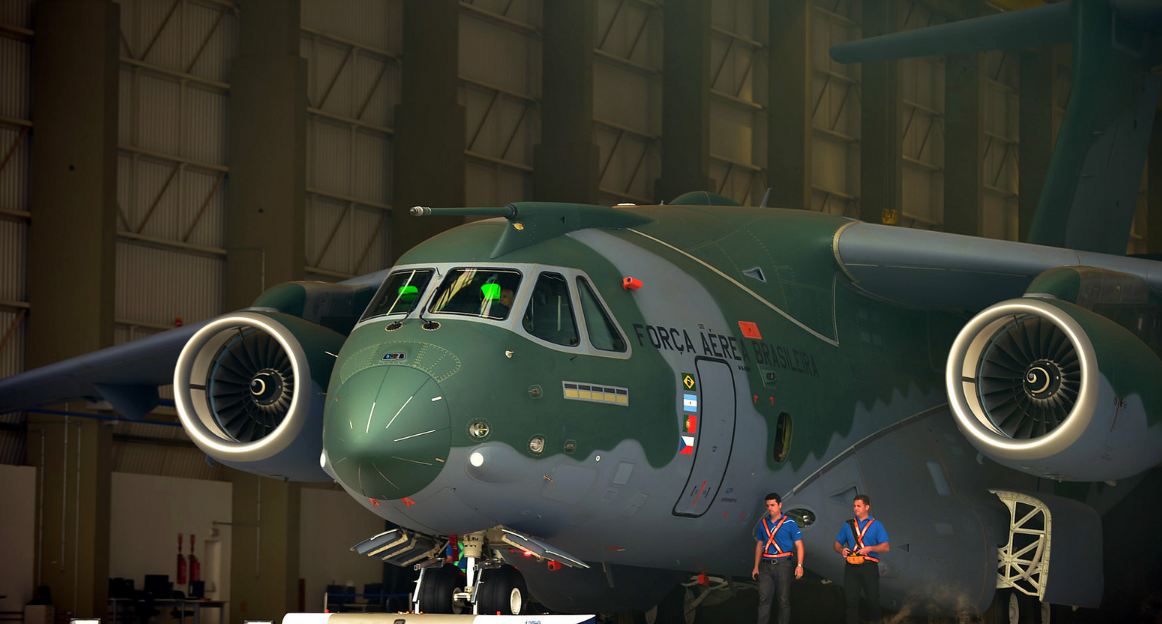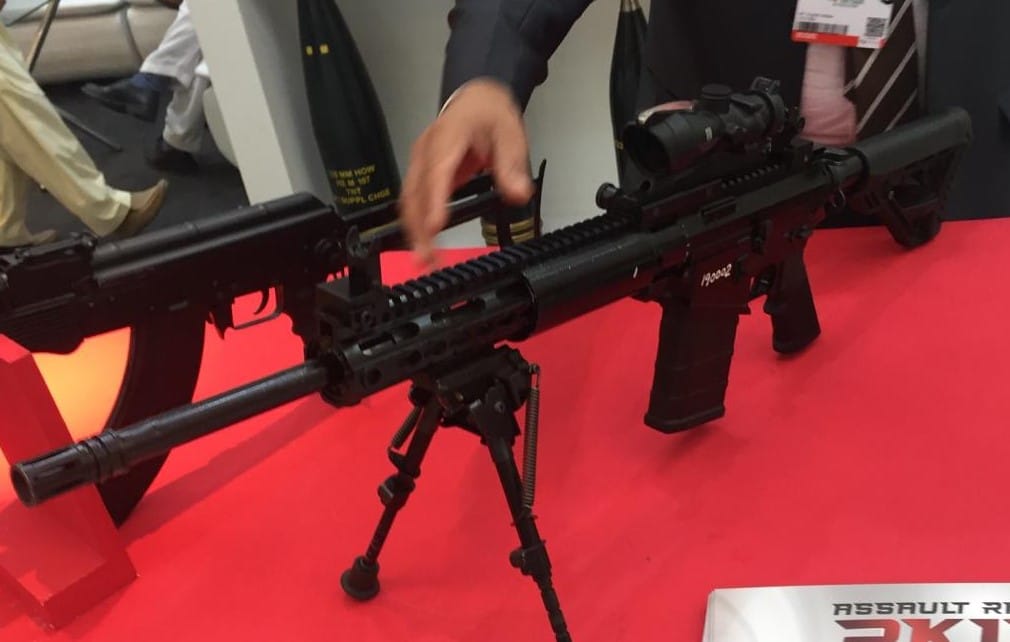2168Views 29Comments

China launches technology transfer hub in Pakistan
As part of its One Belt One Road (OBOR) initiative, China launched a China-South Asia Technology Transfer Centre (CSTTC) in Islamabad, Pakistan on July 08.
The CSTTC was established at the Pakistan Council of Scientific and Industrial Research (PCSIR) and was inaugurated by China’s Deputy Premier and Minister for Science and Technology Dr. Wan Gang and his counterpart in Pakistan the Minister of Defence Production and Science and Technology Rana Tanveer.
Speaking to local media (e.g. The Express Tribune), the Chairman of the PCSIR, Dr. Shahzad Alam, stated that “China would provide financial support to Pakistan [and other states] for … centres and research laboratories for technology transfer and development.”
According to a PCSIR press release, Dr. Alam said that the two sides discussed “26 joint research and development” and that memoranda-of-understanding (MoUs) were in the pipeline to begin implementing these proposals. Dr. Alam added (via APP) that energy and engineering were areas of priority.
Notes & Comments:
It is unlikely that the CSTTC will serve as a direct conduit for defence technology transfer programs. Rather, such transfer-of-technology (ToT) elements are facilitated through acquisitions. The Pakistan Navy’s order for eight Hangor-class submarines from China Shipbuilding Industry Corporation (CSIC) will require CSIC to establish a production-relevant training centre at Karachi Shipyard & Engineering Works (KSEW) to enable KSEW to carry out its workshare tasks. With the first steel-cutting ceremony scheduled for October 2020, KSEW is responsible for manufacturing four of the eight Hangor-class submarines.
However, Pakistan could utilize the CSTTC to facilitate capacity building in areas that support indigenous development and manufacturing. For example, investment in material sciences, metallurgy, electronics, programming and other such areas could help Pakistan build domestic suppliers of key inputs for military applications. In this respect, the CSTTC has the potential to partly feed the Kamra Aviation City initiative.
Besides the necessity of time, there are potential obstacles and risks. For Pakistan to assume ownership of critical and costly tasks, it will require local capacity in terms infrastructure and human resources. With the latter, several steps are being undertaken to increase the number of science, technology, engineering and math (STEM) professionals, such as Air University’s expansion campus in Kamra. However, investment is also necessary for expanding the availability – and enrollment – of primary and secondary education in STEM and other relevant fields so as to guarantee a healthy candidate pool for Air University and others.
Pakistan’s economic constraints have hampered the government’s fiscal capacities as well as the private sector’s ability and willingness to support development. Granted, insufficient policy coordination between Pakistan’s various state organs and government ministries are factors for causing delay and inefficiencies, but insufficient capital (public and private) stymies economic activities necessary for employment, wealth creation and the creation of high-value exports. Thus, foreign capital is generally sought to sustain these activities. If these foreign investments are connected to ToT, then the outcome of ToT may be less than optimal. For example, a foreign investor may tailor ToT to manufacturing (if not less) without necessarily investing in domestically sourcing inputs, such as composite materials.
Unfortunately, it is difficult to approach fiscal stability when significant public funds are routinely required to sustain recurring counterinsurgency campaigns (following the U.S. invasion of Afghanistan) and to repay public debt (borne from prior and future fiscal deficits deepened by debt and internal conflict). Traditional challenges, such as political instability and public corruption, compound the relatively newer challenges, thus dampening the potential stated by the PCSIR (or the PAF in the case of Kamra Aviation City). However, if steps are taken to address these structural challenges, the CSTTC could valuably assist Pakistan in terms of education, building capacity for organic research and development and providing both talent and material means for the rise of local industry players to serve domestic needs and compete globally.



29 Comments
by ali amanat
Its a huge step taken by china to assisst pakistan in such critical industrial development and research and development especially in the field of metallurgy , electronics , ship building, avionics and space related education and related facilities, main problem is corruption and government ministerial delaying tactics, collaboration with univercities , private sector and local vendors must be taken in confidense to share and avail opportunity, to make a pool of highly trained skilled and educated work force not bureaucrate and officers, and these centers must be managed and run by the pac, ndc , air weapon,s complex to control the corruption .
by Tariq A. Mahmood
It is an excellent move towards self sufficiency.
by Steve
It’s not only military. There’s is a large number of civilian areas that badly need upgrading. Car, truck, tractor and locomotive engines, Civilian machinery and electrical/electronics, civilian airlines (covered by Kamra), space research etc etc. Even things like genetically modified crops, drip irrigation equipment, food processing, refrigeration, cotton ginning machines, sports goods made of carbon fibre, medical equipment with electronics build in etc, all of which is the backbone of our economy is primitive and low tech to put it mildly. A lot of machines are imported second hand from China and Japan. Private sector investment is key as they could make money from it. But our industrialists seem content with making money the old fashioned way, even though foreign markets are increasingly turning toward high tech and hitting these people in the wallet. Unless imports threaten their very livelihoods, investing in research is not going to happen, and we will permanently become a supplier of raw material like cotton yarn to other countries. Corruption by government officials also cripples any initiative.
by Steve
Muslims never learned how to build machines. This may help address that fundamental flaw.
by Steve
Hoodbhoy is a bit of a depressive windbag but his article is an eye opener about how deep the rot in education goes.
https://www.dawn.com/news/1342483
by Tahir Din Ch
That Good News Coming Forward for Excellent condition.
by Ali Afzal
Pakistan can develop a gunship helicopter jointly with China or at least receive technology to produce some components.
by Shafiq Ahmed
A much needed step in the right direction.As a Nation we should never loose hope despite the fact that our rulers generally suffer from myopia and not much interested in Pakistan’s development as they deposit and invest their money in other countries.If Chinese can make their country great so can we.I hope some day we will produce lot of Nobel Prize winners , mathematicians, economist and experts in science and technology
by Rizwan
I respect your intellect and generally illuminating comments, but that is absolutely not true. You need to brush up on your history, my friend! Why we fell behind is a whole another ball of wax.
by ɱαѵ∈ʀϊ¢ƙ
Hoodbhoy is clearly picking at “Islami” colleges who probably won’t pass the MIT, Stanford, etc. exams but then again they don’t have to because you don’t need everyone to be an engineer or a doctor because someone needs to be the nurse and the general contractor.
by jamshed_kharian_pak
English Political System in Force in Islamic Republic Of Pakistan causing immense pbs for the Local Pakistanis! it’s time to kick-start education in Ourdou Of Course English can stay for some years to cover Ourdou difficulties! use Islamic Shariat Laws and work like every country
by jamshed_kharian_pak
Steve you need to read some Islamic Books before commenting or Air Firing!
by jamshed_kharian_pak
Islamic Republic Of Pakistan is already Very Powerful Country we can progress more
by jamshed_kharian_pak
Until New Political System is Formed & Ready, Armed Forces of IR Pakistan must watch very carefully all the Projects
by jamshed_kharian_pak
All advices are welcome, but New Political System is Prerequisites
by Steve
I’m talking about current situation. Muslims were innovators but 100’s of years ago.
by Steve
My friend please give me an example to refute, less than 300 years old.
by Steve
Definition of machine; “an apparatus using mechanical power and having several parts, each with a definite function and together performing a particular task”. Please give an example of Muslims INVENTING or independently building a machine. Example should not be before the last 300 years. Please don’t say Brandreth road Lahore make water pump motors lol.
by Steve
I would respectfully submit that to solve a problem we all first have to admit the problem exists. If there is no problem with education or machine building why are Muslims in the c**p and being kicked by everyone. Please don’t say it’s a Jewish/American conspiracy.
by Steve
My dear friend, English is the language of science and communication these days. Most international scientific conferences are held in English. It will be much easier to disseminate knowledge to our country if people are good in English. Large countries like India and China also sent 1000’s of students abroad to study mostly to America and UK, as do all our Pakistani elite. The key is quality. If the quality of our education is better than Japan and USA for example, and we lead the world in science then by all means please switch to Urdu. Considering the mess over the last 20 years, the less said about the political system in Pakistan, colonial or religious based the better.
by GhalibKabir
your statement is succint and is very valid. deserves many more likes.
by jamshed_kharian_pak
Steve you are educated person you know what I am talking about, half titaar half batair has caused immense damage to IR Pakistan, we have to leave the English political system in force in Ir Pakistan, we are a Muslim Country this is the main reason we stop to let play our English educated political leaders to govern Ir Pakistan any more, we must start now applying Islamic Shariat Laws in our Political life
by Rizwan
You said Muslims “never learned how to build machines”. I disagreed with that. Now you say “less than 300 years”! Well, Google “Tipu Sultan’s Rockets”. That was about 300 years ago. You know what happened to Tipu Sultan, so you know what happened to his rockets.
by Steve
Tipu’s rockets were not machines according to the definition. I was talking about industry and the industrial revolution that bypassed Muslims.
by Steve
How will you solve the problem of formation of government, succession, education, industry, taxation, justice, law enforcement etc etc.
by jamshed_kharian_pak
Islamic Political Central Govt with Sharait laws are the safeguard of our culture the questions you invoke are technically solvable without any mystery
by Rizwan
Well, thank you for admitting that Muslims were innovators at some point in history. That is different from your blanket statement that, “Muslims never learned how to build machines”. Like I said, we just fell behind. Here’s a link to an article some might find interesting http://www.muslimheritage.com/article/machines-al-jazari-and-taqi-al-din
by Steve
The problem we face is huge, semantics notwithstanding. We should recognise that, rather than living in a dream world of ancient glories. Such as Muslim scientists in the Middle Ages, which is of interest only to people in Oxford or Cambridge (not usually Lahore or Karachi) writing a PhD in ancient Muslim innovation. I recognise that this may be slightly different but linked matter, and I’m not talking about you personally so don’t take offence, but our people often retreat into the familiar and the religious to compensate for disasters. They may think it trumps everything. For instance; “We may be destroyed by the infidel, but he won’t go to heaven and I will”. This kind of thinking will never allow us to raise our game to compete with people who are far far ahead and pulling further away with every passing day. Muslims have been down for 300 years which is a long long time, since the Mughal and Ottoman Empires fell. It’s time to embrace change, science, and innovation, and learn from others who have done well. We need a renaissance not excuses or denials.
by Rizwan
No argument with that. It always safer to remember the adage, “Never say never”. As things stand, we have a long way to go before we catch up, let alone getting ahead. My point is that we are as capable as anyone else. We were ahead at one time, but fell behind. As a physician, I can tell you that the treatment cannot be planned properly if the diagnosis is not correct. We need to make a proper diagnosis of our sickness, so we can plan the treatment. No point in complaining that we never did this or that. I make no claims to having the right diagnosis, but I have hope that things are gradually moving in the right direction in Pakistan, even though with hiccups. This backwardness is a societal problem that needs input from multiple sources. Not only do we have internal problems of proper governance and accountability, but we also face external and regional threats that can suck us into unexpected or unforeseen disasters, eg. Afghanistan, ISIS, Taliban, and the longstanding instability of the Kashmir problem. My own feeling is that the maximum bang for the buck lies in education. If we just did that one thing right, we could see a major change within one generation, ie 25 years. If we pursued proper economic policies along with that, it would be icing on the cake. Let’s not crow about CPEC too much. CPEC is an achievement of China, not Pakistan. Pakistan just happens to be a beneficiary, but we could even mismanage that and end up being losers, I don’t know. I see CPEC as a gift of God, a lifeline thrown to Pakistan, which could help us get going in the right direction, but we could also mess that up. I hope not.